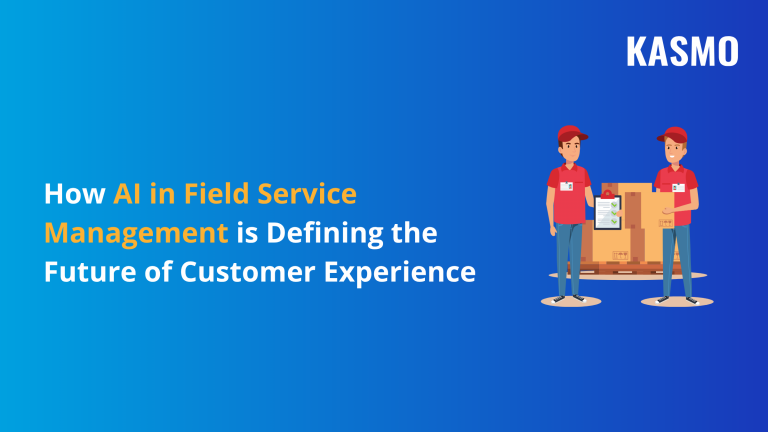AI in Field Service Management: Is it Necessary?
Mobile workers are increasingly expected to deliver quick, seamless, and personalized service. According to recent research by Salesforce, 76% of field technicians say customers expect more than ever, and 72% of mobile workers feel empowered after using technology. Businesses need to leverage AI in field service management to further enhance customer experience and help field service technicians manage the increasing customer expectations.
So, what makes AI so essential for field service operations? It’s the key to streamlining tasks, improving response times, and elevating customer satisfaction. From scheduling field service technicians to dispatching the right technician, managing customer expectations is now easy.
There are several challenges faced by field service technicians. Let’s see how AI eliminates these challenges:

Smarter Knowledge Management
One of the primary challenges faced by field technicians is quickly accessing accurate information. Whether they’re searching for error codes, troubleshooting guides, or service history, traditional keyword searches can be time-consuming and inefficient. Businesses leveraging AI and natural language processing (NLP) capabilities can help field service technicians retrieve relevant solutions instantly. This not only boosts technician productivity but also minimizes downtime during service calls.
Predictive Maintenance Made Easy
AI thrives on data, which means that historical maintenance records, equipment specs, and failure logs can be utilized easily. By analyzing this data, AI-powered systems can predict when a machine or part is likely to fail and schedule proactive maintenance. Predictive insights help prevent costly breakdowns, improve customer satisfaction, and reduce emergency service requests, transforming the future of field service.
Enhanced Dispatching and Scheduling
Field service scheduling was challenging when businesses were using traditional methods for scheduling. However, after leveraging AI-powered tools, businesses can optimize scheduling based on job complexity, location, traffic patterns, and technician skills. For example, if a technician has just finished a job in location “A”, AI agents can assign them the next closest service request that matches their skill set. This level of optimization leads to faster service, reduced fuel costs, and better utilization of field service technicians.
Fewer Service Calls Through Self-Service Tools
“72% Of customers won’t reuse a company’s chatbot after just one negative experience.” By integrating AI-powered chatbots into field service apps, companies can provide technicians and customers with real-time answers through a user-friendly interface. These bots can handle scheduling, status updates, and even troubleshooting—cutting down significantly on customer service load and wait times. It is also vital for businesses to create options for businesses that will empower customers to stay engaged with the brand as well as solve their own challenges, as 61% of customers would rather use self-service for simple issues.
Data-Driven Decisions
Leveraging AI in field service management empowers field service technicians to overcome their challenges while communicating with both customers and their headquarters. By analyzing trends in service calls, work order histories, and parts replacements, AI helps businesses identify patterns and optimize resource allocation. For example, a sudden spike in service requests for a particular device model might indicate a design flaw. AI can surface these insights early, allowing businesses to take corrective action and avoid increasing customer dissatisfaction.
Responding to Alerts Faster and Smarter
Most of the time, field service technicians, when they hit the road, don’t have a clear idea of what the problem the customer is facing or what tools they’ll need to fix it. This lack of upfront information leads to wasted time, unnecessary return trips, and frustrated customers. AI changes that.
Platforms like Agentforce, use data to auto-generate work orders, track inventory, and sync logistics in real time. When field service technicians leverage the mobile field service app before heading out, technicians can see exactly what’s needed, transfer parts to the right vehicle, or even meet a colleague en route to pick up missing equipment. AI ensures the right technician arrives at the right location with the right tools, reducing delays and improving first-time fix rates.
On-the-Go Problem Solving
Technicians often arrive at job sites without detailed customer histories or equipment documentation. Without access to past service records or previous troubleshooting attempts, even a minor issue can turn into a major challenge for a field service technician. Mobile field service apps provide technicians with real-time access to work order summaries, past site visits, purchase history, and inventory availability.
AI can even generate intelligent summaries of long work orders or offer recommendations based on previous issues faced by customers. Mobile forms and knowledge bases filled with how-to articles and videos allow field service technicians to solve issues quickly.
Elevating Technician Productivity and Reducing Burnout
The future of field service relies heavily on the productivity of field service technicians and customers. By eliminating repetitive tasks, reducing uncertainty, and enabling faster resolutions, AI helps mobile field workers feel more competent, confident, and valued. Technicians can now focus on solving more complex problems and delivering value. With better tools, better insights, and better support, the entire service journey becomes more rewarding for both technicians and customers.
What Technologies Can be Used to Transform the Future of Field Service?
Agentic AI
Agentforce integrated with Salesforce Field Service, can schedule appointments, generate work orders, provide access to data in near real-time, and interact with customers through a conversational interface, all while adhering to your operational rules. Agentforce is more than just a traditional chatbot. It provides services to customers around the clock, enabling faster issue resolution, and providing highly personalized experiences that feel human.
The best part about leveraging Agentforce? It is built to learn. Over time, it adapts to evolving expectations of consumers, refining how they communicate, anticipating problems, and providing customized solutions to customers. By deploying Agentforce, businesses can improve customer satisfaction (CSAT) and build stronger brand loyalty.
Voice AI Agents
Voice AI agents are revolutionizing how field service technicians operate on the job. Rather than stopping mid-task to access documentation or log a service update, technicians can now simply speak commands. Want to check pre-job instructions, request part replacements, or log task completion? Just ask the voice agent.
This hands-free model eliminates manual data entry, speeds up response times, and reduces the likelihood of human error. For instance, field service technicians can verbally ask for equipment diagnostics, get troubleshooting tips, or even update the CRM in real time, without ever pulling out a tablet or typing on a phone.
Salesforce Data Cloud for Field Service
A trusted data platform like Salesforce Data Cloud ensures that every action taken in the field is informed, accurate, and aligned with broader business goals. It unifies data across service histories, asset performance, customer behavior, and more, creating a single source of truth accessible to everyone in field service.
But the benefits don’t stop there. Data Cloud also increases the chances of businesses earning profits by identifying cross-sell and upsell opportunities during routine appointments. Moreover, the platform supports seamless collaboration across teams, channels, and devices. Whether it’s through Slack, WhatsApp, mobile apps, or a field service portal, team members can coordinate in real time. Contractors and technicians alike can share updates, sync schedules, and access relevant data instantly, making every customer interaction consistent and efficient.
 Is Customer Expectations Making It Necessary for Businesses to Leverage AI in Field Service Management?
Is Customer Expectations Making It Necessary for Businesses to Leverage AI in Field Service Management?
According to recent research by Salesforce, 74% of mobile workers report that customer expectations are higher than ever, and 73% note that customers now expect a personal touch in every interaction. Meeting these rising standards manually is a daunting task, especially with increasing service demand and limited technician availability. That’s why businesses are rapidly implementing AI to streamline field service management.

Real-Time Service Updates That Build Trust
Deploying AI Agents helps businesses empower their customers with live technician tracking, automated ETAs, and status alerts throughout the service journey. These updates can be delivered through SMS, email, or app notifications, giving customers control and peace of mind. This results in fewer service-related complaints and a significant boost in brand loyalty.
AI-Powered Self-Service for Instant Problem-Solving
Many customers prefer to solve challenges on their own- especially basic problems like resetting a router, flipping a circuit breaker, or cleaning an air filter. This is where AI in field service becomes an enabler of autonomous customer support.
By using AI to generate and update digital resources such as knowledge base articles, interactive troubleshooting flows, and video tutorials, businesses empower customers to solve common issues quickly—anytime, anywhere; and when a technician is required, AI can simplify the booking process by automating scheduling and surfacing the nearest available time slots.
This self-service model doesn’t just elevate customer satisfaction—it also frees technicians to focus on complex, high-value jobs. It’s a win-win solution that helps organizations scale efficiently while still managing customer expectations effectively.
Proactive Service: Solve Before They Even Complain
The most impactful customer experience is often the one that never requires a call at all. Thanks to AI, data analytics, and IoT connectivity, businesses can now deliver proactive field service—fixing issues before customers even know there’s a problem.
Whether it’s sending a reminder for basic upkeep, alerting users about potential connectivity problems, or dispatching a technician based on predictive analytics, AI helps identify and address risks early.
AI could analyze historical data and usage patterns to remind customers about routine maintenance like software updates or filter replacements. Predictive alerts can notify technicians about an impending failure, allowing them to act before the issue escalates.
This shift from reactive to proactive support not only improves operational efficiency and reduces downtime but also shows customers that their provider is invested in long-term asset performance and satisfaction.
Businesses Need to Have an Optimized Field Service Management: True or False?
If businesses want to remain relevant and competitive in the future of field service, they must do more than simply react—they need to plan, innovate proactively, and invest strategically in both technology and people.
One of the biggest challenges facing the field service sector today is the evolving nature of the workforce. There’s a visible gap in the services required and qualified professionals. To bridge this gap, companies must invest in training and upskilling their existing workforce. Here’s how businesses can prepare for what’s next:
Involve Your Teams Early
To design effective field service strategies, it’s crucial to engage operations leaders from the start—from ideation and planning to testing and implementation. Their insights into day-to-day workflows, technician pain points, and customer bottlenecks help ensure that changes are relevant and practical.
Embrace Continuous Innovation
Field service isn’t static. The best-performing companies don’t just adopt technology—they keep evolving with it. Investing in AI-powered platforms like Agentforce, staying on top of emerging trends, and fostering a culture of innovation can help field service teams stay flexible, scalable, and future-ready.
Let Data Guide Customer-Centric Experiences
Today’s customers want personalized, proactive service, and data is the key to delivering it. Whether it’s anticipating maintenance needs, offering tailored solutions, or adjusting communication preferences, a data-first approach ensures that every customer interaction feels intentional and impactful. Use analytics to continuously refine your field service processes and keep the expectations of consumers front and center.
Empower Your Field Service Technicians with the Right Tools
At the end of the day, it’s your people who deliver value on the front lines. Equipping them with AI tools, mobile apps, knowledge bases, and collaborative platforms like Salesforce, makes it easier for them to deliver fast, accurate, and personalized service. When employees feel empowered, they’re more productive, more engaged, and more likely to stay with your organization long term.
The question isn’t whether businesses should optimize their field service operations—it’s how fast they can do it. The combination of shifting workforce dynamics, evolving customer needs, and emerging technology has empowered organizations to go for a change. Companies that embrace this moment and build intelligent, agile, and customer-centered field service models will not only survive but also lead the industry into its next chapter.




